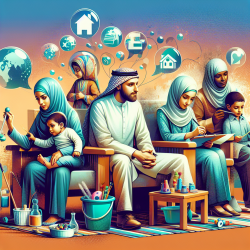Introduction
In the realm of speech-language pathology and mental health care, practitioners are continuously seeking innovative strategies to enhance the well-being of children. The study titled "Fully-integrated medical home for people with severe and persistent mental illness: A description and outcome analysis of a Medicare Advantage Chronic Special Needs Program" provides a compelling blueprint for improving mental health services through integrated care models. By understanding and implementing these findings, practitioners can significantly improve outcomes for children with severe and persistent mental illnesses.
Understanding the Integrated Care Model
The research highlights a comprehensive approach to mental health care through a fully-integrated medical home model. This model emphasizes the coordination of medical, psychiatric, and social services, offering a seamless continuum of care. For children with severe and persistent mental illness, such an approach can be transformative, addressing not only their mental health needs but also their physical and social well-being.
Key Components of the Model
- Medical Home: Each child is assigned a clinical program director, primary care physician, psychiatrist, and a life coach. This team works collaboratively to develop and monitor individualized care plans.
- Wellness Centers: These centers provide access to case management, clinical groups, and recovery activities. They serve as a hub for holistic care, fostering community integration and personal growth.
- Case Management: Life coaches play a pivotal role in ensuring adherence to care plans, facilitating communication between care providers, and supporting children in achieving their personal recovery goals.
Benefits for Practitioners
Implementing an integrated care model can enhance a practitioner's ability to deliver effective and comprehensive care. By adopting this model, practitioners can:
- Reduce hospitalizations and emergency visits through proactive management and preventive care.
- Improve adherence to treatment plans by fostering strong relationships between children, families, and care teams.
- Enhance overall health outcomes by addressing both mental and physical health needs.
Encouraging Further Research
While the study provides a robust framework, further research is essential to tailor these findings to the unique needs of children. Practitioners are encouraged to explore additional studies and collaborate with interdisciplinary teams to refine and expand integrated care models. By doing so, they can contribute to a growing body of evidence that supports innovative approaches to mental health care for children.
Conclusion
The integration of medical, psychiatric, and social services within a fully-integrated medical home model offers a promising path forward for practitioners seeking to improve outcomes for children with severe and persistent mental illness. By embracing data-driven and evidence-based practices, practitioners can make a profound impact on the lives of the children they serve.
To read the original research paper, please follow this link: Fully-integrated medical home for people with severe and persistent mental illness: A description and outcome analysis of a Medicare Advantage Chronic Special Needs Program.










